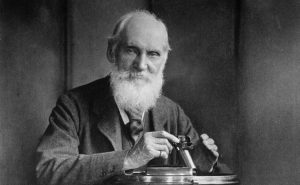William Thomson, 1st Baron Kelvin, an Irish mathematical physicist and engineer who formulated the first and second laws of thermodynamics.
Biographical Overview
Born in Ireland, 1824-1907 Physicist Formulated the First and Second Laws of Thermodynamics, established the Joule–Thomson effect, Thomson effect (thermoelectric), Mirror galvanometer, Siphon recorder, Kelvin material, Kelvin water dropper, Kelvin wave, Kelvin–Helmholtz instability, Kelvin–Helmholtz mechanism, Kelvin–Helmholtz luminosity, Kelvin transform, Absolute Zero, Kelvin’s circulation theorem, Stokes’ Theorem, Kelvin bridge, Kelvin sensing, Kelvin equation, Kelvin-Varley divider, Magnetoresistance, coining the term ‘kinetic energy’
Awards
Smith’s Prize (1845), Royal Medal (1856), Keith Medal (1864), Matteucci Medal (1876), Albert Medal (1879), Copley Medal (1883), John Fritz Medal (1905
Worldview
Using a biblical worldview perspective, Kelvin successfully applied the scientific method to investigate the laws of nature, His worldview is notable from what he said –
“We feel that the power of investigating the laws established by the Creator for maintaining the harmony and permanence of His works is the noblest privilege which He has granted to our intellectual state.”
“As the depth of our insight into the wonderful works of God increases, the stronger are our feelings of awe and veneration in contemplating them and in endeavoring to approach their Author … So will he [the earnest student] by his studies and successive acquirements be led through nature up to nature’s God.”
“Overpoweringly strong proofs of intelligent and benevolent design lie all around us and if ever perplexities, whether metaphysical or scientific, turn us away from them for a time, they come back upon us with irresistible force, showing to us our nature, the influence of free will, and teaching us that all living beings depend on one ever-acting Creator and Ruler”
“We only know God in His works, but we are forced by science to admit and to believe with absolute confidence in a Directive Power-in an influence other than physical, or dynamical, or electrical forces.”
“We have the sober scientific certainty that the heavens and earth shall ‘wax old as doth a garment’ . . . . Dark indeed would be the prospects of the human race if unilluminated by that light which reveals ‘new heavens and a new earth.’”
“Overwhelming strong proofs of intelligent and benevolent design lie around us.”
“Do not be afraid of being free thinkers. If you think strongly enough you will be forced by science to the belief in God, which is the foundation of all religion. You will find science not antagonistic but helpful to religion.”
“Mathematics and dynamics fail us when we contemplate the Earth, fitted for life but lifeless, and try to imagine the commencement of life upon it. This certainly did not take place by any action of chemistry, or electricity, or crystalline grouping of molecules under the influence of force, or by any possible kind of fortuitous concourse of atoms. We must pause, face to face with the mystery and miracle of creation of living creatures.”
“His [William Paley’s “Natural Theology] close study of the phenomena of nature, his constant discovery of new marvels, seemed to bring him near and nearer to God, and he could never understand anyone treating science with any other feeling than reverence.”
“The deeper he [William Paley] delved into Science and the more he studied its mysteries, the greater his veneration for the Maker of it all.”
On May 23, 1889, in his address to the Chairman of the Christian Evidence Society in London, Kelvin explained –
“My primary reason for accepting the invitation to preside was that I wished to show sympathy with this great Society which has been established for the purpose of defending Christianity as a Devine Revelation.
“I also thought something was due from Science. I have long felt that there was a general impression in the non-scientific world believes Science has discovered ways of explaining all the facts of nature without any definite belief in a Creator. I have never doubted that impression was utterly groundless.
“It seems to me that when a scientific man says – as it has been said from time to time – that there is no God, he does not express his own ideas clearly. He is, perhaps, struggling with difficulties; but when he says he does not believe in a creative power I am convinced he does not faithfully express what is on his mind. He is out of his depth…
“I may refer to that old but never uninteresting subject of the miracles of geology. Physical Science does something for us here. Peter speaks of scoffers who said that “all things continue as they were from the beginning,” but the Apostle affirms himself that “all these things shall be dissolved.”
Lord William Thomson Kevin


